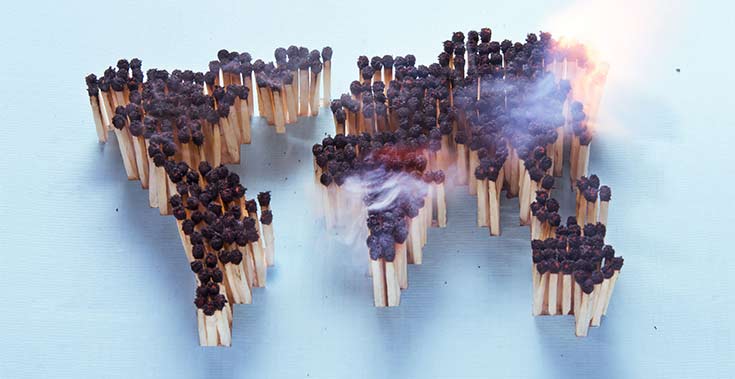Climate disasters increase risk of armed conflict in multi-ethnic countries
Climate disasters like heat-waves or droughts enhance the risk of armed conflicts in countries with high ethnic diversity, says the Potsdam Institute for Climate and Impact Research (PIK).

Several of the world's most conflict-prone regions, including North and Central Africa as well as Central Asia, are both exceptionally vulnerable to human-made climate change and are characterised by deep ethnic divides (Pogonici / 123rf)
This finding, to be published in the Proceedings of the National Academy of Sciences, can help in the design of security policies, especially as future global warming from human-made greenhouse-gas emissions will increase natural disasters and therefore also likely risks of conflicts and migration.
"Devastating climate-related natural disasters have a disruptive potential that seems to play out in ethnically fractionalised societies in a particularly tragic way," says lead author Carl Schleussner from the Berlin think-tank PIK.
Almost one quarter of conflicts in ethnically divided countries coincide with climatic calamities, the scientists found; importantly, this is even without taking climate change into account.
"Climate disasters are not directly triggering conflict outbreak, but may enhance the risk of a conflict breaking out, which is rooted in context-specific circumstances. As intuitive as this might seem, we can now show this in a scientifically sound way," says Schleussner. "We've been surprised to which extent results stick out compared to inequality, for example."
Previous research often either focused on climatic variables such as temperature increase that cannot be directly translated into societal impacts, or has been limited to case studies. The new study moves beyond that by focusing directly on natural disaster-related economic damage data, collected by the international reinsurance market leader Munich Re. Using the mathematical method of event coincidence analysis, this is combined with a conflict dataset established by security research, and a common index for ethnical fractionalisation. The study looks at the period 1980-2010.
"We've been surprised by the extent that results for ethnically fractionalised countries stick out compared to other country features such as conflict history, poverty, or inequality," says co-author Jonathan Donges, co-head of PIK's flagship project on co-evolutionary pathways COPAN. "We think that ethnic divides may serve as a predetermined conflict line when additional stressors like natural disasters kick in, making multi-ethnic countries particularly vulnerable to the effect of such disasters"
The study cannot provide a risk assessment for specific states. Since armed conflicts and natural disasters are, fortunately, rare events, data from single country is necessarily limited and does not suffice for statistical analyses.
"Armed conflicts are among the biggest threats to people, killing some and forcing others to leave their home and maybe flee to faraway countries. Hence identifying ethnic divide and natural disasters as enhancing destabilisation risks is potentially quite relevant," says co-author Hans Joachim Schellnhuber, director of the PIK. "Human-made climate change will clearly boost heatwaves and regional droughts. Our observations combined with what we know about increasing climate change impacts can help security policy to focus on risk regions."
Several of the world's most conflict-prone regions, including North and Central Africa as well as Central Asia, are both exceptionally vulnerable to human-made climate change and are characterised by deep ethnic divides. "So our study adds evidence of a very special co-benefit of climate stabilisation: peace," Schellnhuber concludes.